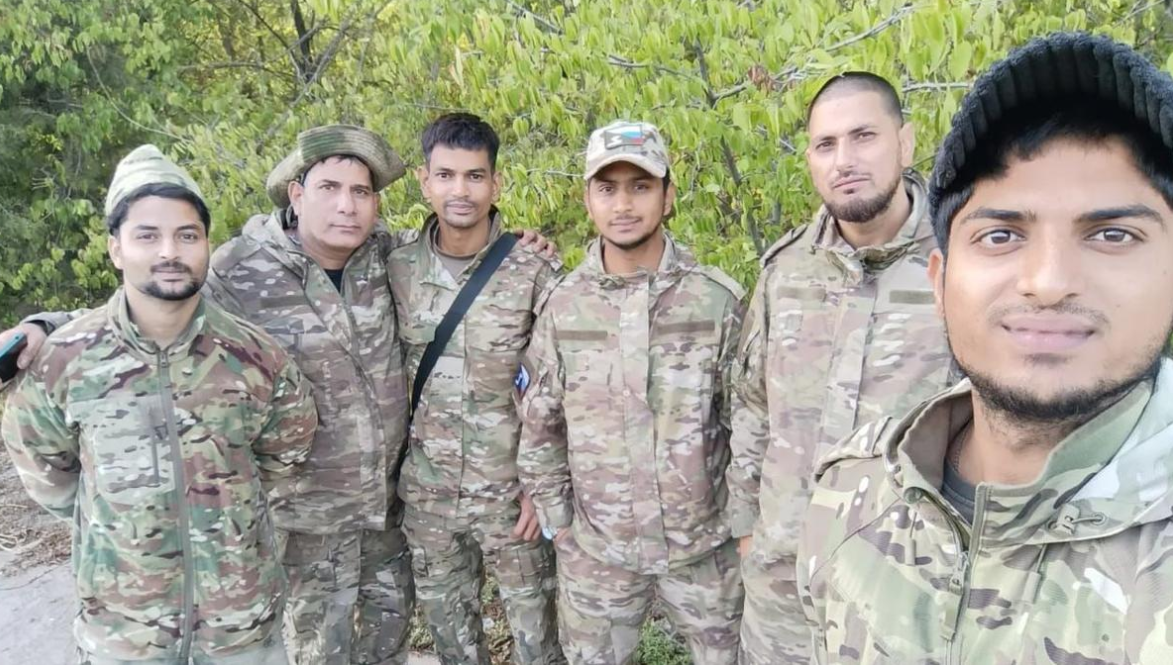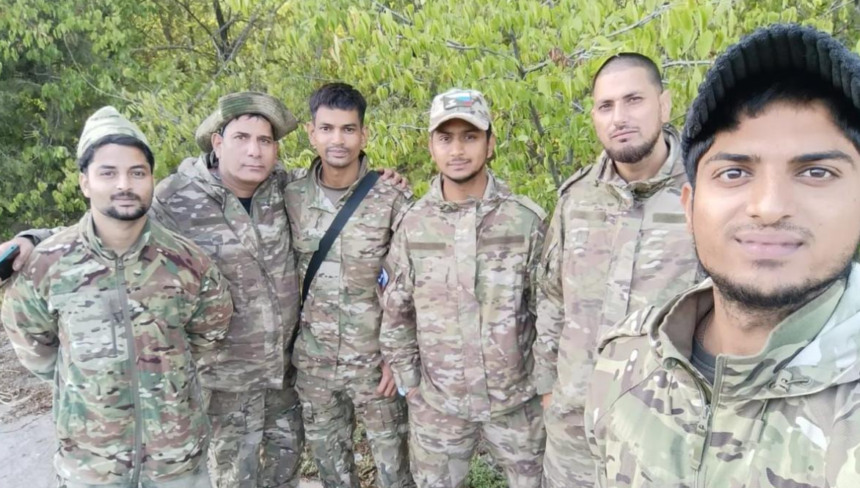Introduction
In Russian Army a rare and poignant story of survival, Mohammed Sufiyan, a young man from Narayanpet, Telangana, recently returned home after serving as a helper in the Russian Army. His journey from the tranquil streets of his village to the harsh and unforgiving battlefields of Russia is a testament to the complex circumstances that lead young men like Sufiyan into life-altering situations far from home. Sufiyan’s experience sheds light on the hardships, dangers, and psychological toll that comes with being involved in a foreign war. His story, filled with emotion and the horrors of war, provides a glimpse into the often hidden world of Indian recruits in foreign military forces.
This article chronicles Sufiyan’s journey, his life in the battlefield, his return home, and the broader implications of Indian youth being recruited into foreign armies like that of Russia.
The Journey Begins: From Telangana to Russia
Mohammed Sufiyan’s journey into the Russian Army began in a manner that reflects the challenges faced by many young men from economically disadvantaged backgrounds. Growing up in Narayanpet, a small town in Telangana, Sufiyan dreamed of a better future for himself and his family. Like many others in his community, he struggled to find stable employment and was constantly seeking opportunities to improve his economic situation.
In Russian Army the search for work, Sufiyan came across recruitment agents who promised lucrative opportunities abroad. These agents spoke of jobs in Russia, where workers were needed for various roles, including in logistics, construction, and support for military operations. Desperate for work and unaware of the dangers that lay ahead, Sufiyan agreed to join the ranks of Indian recruits heading to Russia. Little did he know that the promise of a well-paying job would soon lead him to the battlefields of a foreign country.
Russian Army Sufiyan’s recruitment into the Russian Army highlights a larger, often unspoken, issue of Indian workers being misled by unscrupulous recruitment agents who exploit their desperation for employment. What was initially presented as a legitimate job opportunity turned into a grueling experience in the service of a foreign military.
Life in the Russian Army: A World of Hardship and Danger
Upon arriving in Russia, Sufiyan quickly realized that the situation was far different from what he had been told. Instead of finding work in a peaceful setting, he was thrust into a world of conflict. Sufiyan was placed in a role as a “helper” in the Russian Army, a position that involved assisting soldiers in various capacities, including logistics, transportation, and even battlefield support. While he was not formally a soldier, his duties often placed him in close proximity to the violence and chaos of war.
Sufiyan recalls the daily hardships of his time in Russia. The Russian Army weather was harsh, with freezing temperatures and long periods of snow. His days were filled with grueling work, often involving physical labor and long hours. He also witnessed firsthand the devastating effects of war, from the destruction of towns and cities to the loss of life. Sufiyan recounts how the constant sound of gunfire and explosions became a part of daily life, creating an atmosphere of fear and uncertainty.
One of the most harrowing aspects of Sufiyan’s experience was the psychological toll of being in a war zone. He describes how the stress of being in constant danger affected his mental health. The fear of being injured or killed was a constant presence, and the trauma of seeing others wounded or killed left a lasting impact on him. Sufiyan, like many others in his position, had no formal training or preparation for the realities of war, making his experience all the more terrifying.
Despite these challenges, Sufiyan managed to survive his time in Russia, relying on his resilience and determination to return home. His ability to endure the hardships of war is a testament to the strength of the human spirit, but it also raises questions about the exploitation of vulnerable workers in conflict zones.
Emotional Return to Narayanpet: A Family Reunited
After spending months in Russia, Sufiyan finally returned home to Narayanpet, where he was met with an emotional reunion with his family. His return was a moment of relief and joy for his loved ones, who had been deeply worried about his safety. For his family, seeing Sufiyan alive and well was a moment of profound gratitude, as they had feared the worst given the dangerous conditions he had faced abroad.
Sufiyan’s homecoming was not just a personal victory for him and his family; it also highlighted the broader issue of Indian workers who find themselves caught in dangerous situations abroad. Sufiyan’s story is one of many, where young men from rural areas in India are lured by the promise of work overseas, only to find themselves in perilous circumstances far from home.
During his emotional reunion, Sufiyan spoke openly about the trauma he experienced and the difficulty of readjusting to life back in India. He recounted how his time in Russia had changed him, leaving him with memories of war that would likely stay with him for the rest of his life. His family, while overjoyed to have him back, could see the emotional scars that the experience had left on him.
The Broader Issue: Indian Recruits in Foreign Armies
Sufiyan’s Russian Army story sheds light on a broader issue that has gained increasing attention in recent years: the recruitment of Indian nationals into foreign armies, particularly in conflict zones. While formal recruitment of Indian citizens into foreign military forces is illegal under Indian law, there have been numerous reports of Indian workers being misled by recruiters and finding themselves in military roles in countries like Russia, Syria, and even parts of Africa.
The economic desperation faced by many young men in India, particularly in rural areas, makes them vulnerable to exploitation by unscrupulous agents. These agents often promise well-paying jobs abroad, only for the recruits to find themselves in dangerous and illegal situations. Many are left without legal protection, and in some cases, their families are unaware of the true nature of the work they have been sent to do.
Russian Army Sufiyan’s experience highlights the need for greater oversight and regulation of overseas recruitment practices. There is a pressing need for the Indian government to crack down on illegal recruitment networks and ensure that Indian workers going abroad are properly informed about the nature of the jobs they are taking. Furthermore, there must be legal protections in place for those who find themselves in dangerous situations abroad, ensuring that they can return home safely. 
The Impact of War: Psychological and Physical Trauma
The trauma experienced by workers like Sufiyan, who are caught in conflict zones, cannot be underestimated. While the physical dangers of war are obvious, the psychological toll is often hidden but just as damaging. Sufiyan’s time in Russia left him with deep emotional scars, as he witnessed violence, death, and destruction on a daily basis.
The impact of war on mental health is well-documented, with survivors often experiencing symptoms of post-traumatic stress disorder (PTSD), depression, and anxiety. For workers like Sufiyan, who are not trained soldiers and have no experience in dealing with the horrors of war, the trauma can be even more profound. Many return home with a sense of disillusionment and emotional detachment, struggling to reintegrate into normal life after experiencing such intense suffering.
In Russian Army Sufiyan’s case, his family has played a crucial role in helping him readjust to life in Narayanpet. The emotional support provided by his loved ones has been instrumental in his recovery, but the scars of his experience will likely remain with him for a long time.
Conclusion: A Story of Survival and Resilience
Mohammed Sufiyan’s story is one of survival and resilience in the face of extraordinary adversity. From his humble beginnings in Narayanpet to the battlefields of Russian Army Russia, Sufiyan’s journey highlights the complex and often dangerous paths that young men from India’s rural areas take in search of a better life. His experience sheds light on the broader issue of Indian recruits in foreign armies and the exploitation of vulnerable workers by unscrupulous agents.
Sufiyan’s return home is a moment of joy and relief for his family, but it also serves as a reminder of the dangers faced by those who find themselves caught in conflict zones abroad. His story underscores the need for greater oversight of overseas recruitment practices and stronger protections for Indian workers abroad.
As Russian Army Sufiyan continues to rebuild his life in Narayanpet, his story stands as a testament to the strength of the human spirit in the face of unimaginable hardship. His resilience and determination to survive have brought him home, but the memories of his time in the Russian Army will remain with him for years to come. ALSO READ:- Amit Shah’s Push for Hindi: A Shift in Administrative Language Across the Home and Cooperation Ministries 2024





